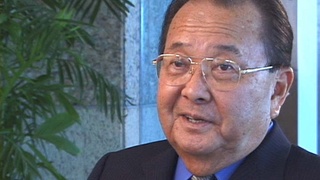Entrevistas
The horror of Hiroshima after the atomic bombing (Japanese)
(Japanese) When I entered into the city of Hiroshima, there were just bodies wrapped in cloth all over the streets. In the river, there still were floating corpses. Yes. That was… (inaudible). Because the area was completely flattened out, we all at first thought that maybe this was due to a huge earthquake, and not the effects of a bombing. But then, after a while, we realized it wasn’t from an earthquake. What could it be? Then, of course, the next day we found out about this thing called the atom bomb.
Yes, we walked and walked, for half a day we walked to the other side of a Hiroshima (train) station. Hmm, the name of the station… is recorded somewhere here, but yes, we walked there. So we’re at this station in Hiroshima—I still remember this. Was it about sundown? We finally stopped to eat some nigiri-meshi (rice balls), and I think it was either a little bit cloudy or raining… For some reason, something, I’m not sure, it was a feeling beyond any man’s imagination—I was overcome with this complete sorrow that I could not even begin to put into words.
So I really experienced the truly horrifying effects of an atomic bomb, and I do tell others that nuclear weapons should never, ever be used again. The experience that my heart went through was just…
Later on, I returned to my convoy and we found out that the atomic bomb had been dropped on August 6th. We had gone through the city just 36 hours after it. So I avoided direct impact, but of course, the radiation took its toll on my body, and I have this condition called pulmonary emphysema—I lose my breath quite easily now. The doctor tells me that it’s probably due to the effects of radiation poisoning...
Data: June 17, 2008
Localização Geográfica: California, US
Entrevistado: Yoko Nishimura
País: Watase Media Arts Center, Japanese American National Museum
Explore More Videos




Loyalty questionnaire
(1916-2010) Resistiu ao alistamento militar, ajudou a formar o Comitê Heart Mountain Fair Play

Fair Play Committee
(1916-2010) Resistiu ao alistamento militar, ajudou a formar o Comitê Heart Mountain Fair Play

Speaking out in camp
(1916-2010) Resistiu ao alistamento militar, ajudou a formar o Comitê Heart Mountain Fair Play

Wanting to take a stand
(1916-2010) Resistiu ao alistamento militar, ajudou a formar o Comitê Heart Mountain Fair Play

Ostracized by the camp newspapers
(1916-2010) Resistiu ao alistamento militar, ajudou a formar o Comitê Heart Mountain Fair Play

On trial for draft evasion
(1916-2010) Resistiu ao alistamento militar, ajudou a formar o Comitê Heart Mountain Fair Play

Draft resisters sent to jail
(1916-2010) Resistiu ao alistamento militar, ajudou a formar o Comitê Heart Mountain Fair Play

Fair Play Committee charged with conspiracy
(1916-2010) Resistiu ao alistamento militar, ajudou a formar o Comitê Heart Mountain Fair Play

Would do the same again
(1916-2010) Resistiu ao alistamento militar, ajudou a formar o Comitê Heart Mountain Fair Play

Arrested in camp for trying to leave
(1916-2010) Resistiu ao alistamento militar, ajudou a formar o Comitê Heart Mountain Fair Play

Treinamento Básico (Inglês)
(1919 - 2006) Veterano da Segunda Guerra Mundial e da Guerra da Coréia

Uma visita ao Jerome após OCS (Inglês)
(1919 - 2006) Veterano da Segunda Guerra Mundial e da Guerra da Coréia
